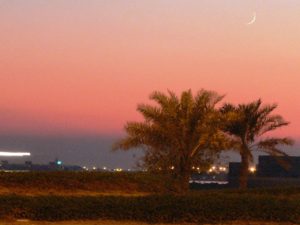Ramadan has ended, the month of Muslim fasting is over.
But in order to help Western friends understand this often misunderstood feature of Islam, here are a few anecdotes that reveal a wide scope of Ramadan diversity.
It may be surprising to some that in Egypt, many churches host iftar, the fast-breaking meal at sunset. I attended two, which I reported on for Christianity Today. It can be a great way to honor Muslims for their commitment, and to build bridges between the two communities.
Inspired by the practice, we looked to imitate. Our daughter invited her school friends and mothers, which included a Christian family. She even encouraged us not to eat or drink – from noon until 7pm – to share the experience. But this experience did not include any men, so I was banished to the back room. One of the mothers is more traditional and the company of women put all at ease. Fortunately, they sent back some food.

On another occasion we went to a friend’s home to break fast with them. Our younger daughter asked if one of the ladies of the house was a Christian, as she didn’t cover her hair. Needless to say, this group was comfortably mixed in gender. We were not fasting with them on this occasion, and decided first to stop by the new mall opened in their neighborhood – which even has an indoor ski park!
The mall was nearly empty, as most people were at work or looking to get home on time to eat again. But Baskin Robbins was open and even offered their free samples. We all indulged. As parents we were careful not to eat or drink in public throughout the day, but made an exception for the ice cream. When we got back to the car, our thermoses emptied.
Similar was an interview I did with a Muslim friend downtown. The temperature was 109 degrees, and to make my way there I walked to the metro, rode in the crowded un-air-conditioned car, then after a short walk outside stuffed myself into a microbus.
All the while there was a water bottle in my bag, unable to surface. Yet when I arrived, my friend kindly offered me a cup of water. What to do?
Muslims know Christians are not fasting, and are generally not offended if a friend eats quietly in front of them. His was a kind gesture on a hot day. But in Egypt Christians generally choose not to eat or drink in front of them from respect. I can’t say if this was the right decision or not. But I took the cup, thanked him for his consideration, and placed it down on the table.
I assured him I would be willing to drink it later, but never did. It was a long trek back home as well, but hopeful a genuine sentiment was communicated.
Later in the month, however, we invited another Muslim friend to break fast at our home. He was without his family for a while, so he could share with us. But he is a non-practicing Muslim, and preferred to eat at our normal dinnertime of 6pm, an hour before sunset.
There is a good bit of diversity in Ramadan, but it doesn’t end there. Unrelated to the month we invited a Christian family to join us for a meal. But surprised we were when they left half their plate untouched. We failed to realize the Christian ‘Fast of the Apostles’ overlapped with Ramadan this year. Coptic Christians abstain from meat during their fasts, which last several days – like Lent – not just from sunrise to sunset. If they are faithful, Coptic Christians can be fasting over half the year.
Unlike us, the local sweet shop is quite accustomed to Coptic fasts and always has a ready stash of Christian-fast-appropriate treats available. Perhaps from habit in filling our order when we visit Christian families, the shopkeeper naturally doled out from that supply. We didn’t realize it until he was done, but said no matter. We were off to visit Muslim friends but judged they taste similar enough. Given the spirit of the season, we don’t think our friends minded – if they even noticed.
You may have an image in your mind of Muslims. There may be an associated thought about Ramadan. Most likely it is true, at least partially. But realize there is much diversity in the Muslim world, and each deserves our understanding and honor. Among some this is difficult (think of fundamentalists). Among others it is easy (think of our friends). I suppose like humanity in general, most are somewhere in-between.
But however difficult to imagine, it becomes easier when you actually know them. And like humanity in general, it can become more difficult when you actually know them well. We all have warts. But we are all also made in the image of God. Knowing this in our own DNA, the church should be at forefront of discovery among Muslims. Curiosity can get us started. Truth will insist on balance. But love is the chief of all virtues.
Let us offer them no less.
